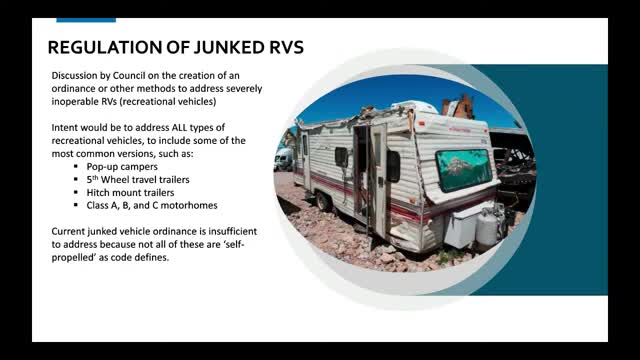Bruceville‑Eddy council debates junked RV regulation, asks staff for draft ordinance
Get AI-powered insights, summaries, and transcripts
Subscribe
Summary
Council members and residents described derelict recreational vehicles as potential health and safety hazards and asked staff to prepare draft ordinance language and sample codes from other cities for the next workshop.
Councilwoman Joyce McLaughlin on Jan. 23 opened a council discussion on whether Bruceville‑Eddy should create or amend ordinance language to address severely derelict recreational vehicles that, she said, pose health and safety hazards to neighbors.
"I'm gonna turn to yes. I just wanted us to discuss… having a junked RV trailer ordinance," Councilwoman Joyce McLaughlin said, describing the city's concern as targeted at "excessive" examples: units with missing doors and windows, significant water penetration, visible rodent or wasp infestation and standing sewage or black mold. "We're talking about excessive damage where it's a real nuisance," she said.
Residents and council members recounted local examples. One neighbor described a unit that has sat near homes and attracted rodents and mosquitoes: "It's within probably 35 feet of my home," the resident said, explaining that traps were deployed because rodents had spread from the derelict unit. Council members and staff repeatedly emphasized that they did not want to penalize owners for minor, cosmetic problems such as a cracked windshield, but to provide a tool for addressing public‑health risks and blight.
City Administrator Kent Manton and code‑enforcement staff told the council the city already enforces junk vehicle and nuisance codes but that current language does not always cover non‑self‑propelled units such as hitch‑mounted trailers, fifth‑wheel units and popup campers. "If council really wanted to enforce on the general nature of the blight and the health and safety issues with junked RVs, then you're going to need some more teeth in the ordinance," Manton said.
Councilman Ricky Wiggins and others urged a practical approach that allows time for property owners to demonstrate active repair efforts. Suggestions during the discussion included a permit or repair timeline, a distance requirement to neighboring homes to address rodent and mosquito spread, and an enforcement process keyed to documented complaints. Several council members said they wanted draft language to review publicly.
The council unanimously voted to table the matter and directed staff to compile sample ordinances from similar cities and to draft proposed definitions of "severely inoperable" or "excessive" damage for discussion at the next workshop.
The council emphasized that enforcement would remain complaint‑driven where neighbors do not object and that the goal is to target public‑health and safety risks rather than ordinary recreational use or minor cosmetic damage.
